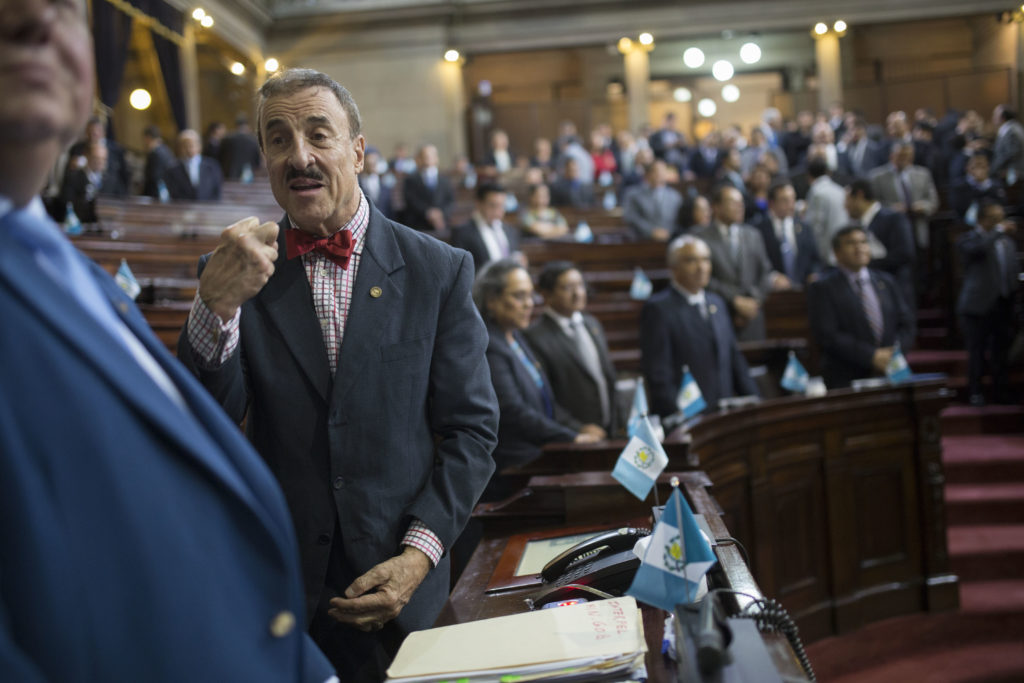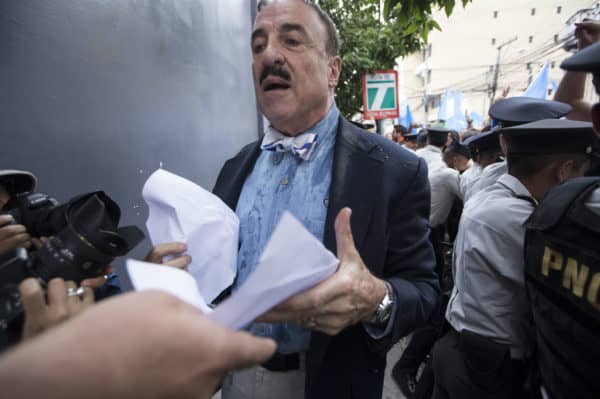(AP Photo/Moises Castillo)
(AP Photo/Moises Castillo)
This piece was originally published at International Justice Monitor and is republished with permission.
A bill was presented in the Guatemalan congress last week that would effectively establish a blanket amnesty for military officials accused of international crimes related to the internal armed conflict, in which an estimated 200,000 lives were lost. The bill seeks to alter the Law of National Reconciliation, which the Guatemalan congress passed in December 1996 in the context of the United Nations-brokered peace accords. That law provides for amnesty for political crimes, but not for international crimes such as genocide, torture, and other crimes against humanity.
The Proposed Legislation
On November 6, 2017, Congressman Fernando Linares Beltranena presented a proposal to reform Decree No. 145-1996, known as the Law of National Reconciliation. This law provides for amnesty for political crimes, but specifically excludes the international crimes of genocide, enforced disappearance, torture, and other crimes against humanity. The reform proposal introduced by Linares Beltranena, and signed by 12 other members of congress, seeks to eliminate this exclusion based on the argument that “to achieve true peace and reconciliation there must be a general amnesty for all the actors of the armed conflict.”
The bill argues that the Law of National Reconciliation failed to take into account an agreement between the government of Guatemala and the National Guatemala Revolutionary Unity (URNG) that there should be a general amnesty for both parties. However, no such agreement exists.
In this post, International Justice Monitor reviews the politics behind the proposal, the reasons it is unlikely the measure will prosper, and the bill’s main proponents.
The Politics Behind the Proposal
Contained in the proposal is a table listing the number of individuals who have been prosecuted or are awaiting trial in cases of human rights violations related to the internal armed conflict. The document notes that 71 military officers have been arrested or prosecuted, but only one member of the guerrilla forces. According to the proposed bill, this shows that the prosecution of grave crimes cases constitutes “a form of judicial harassment of only one of the actors in the conflict, the military.” It is important to recall that the Commission for Historical Clarification found that government was responsible for 93 percent of the human rights violations during the Guatemalan internal armed conflict, while guerrilla forces were responsible for 3 percent, with the remaining violations committed by other groups or unknown actors. The bill also accuses “human rights activists” of seeking to extend the crime of genocide to “ideologies and political militancy.”

Legislator Fernando Linares, left, gestures during a session of Congress in Guatemala City, Monday, Sept. 11, 2017. (AP Photo/Moises Castillo)
The bill proposes repeal of articles 2, 4, and 8 and the amendment of articles 1, 5, and 11 of the Law of National Reconciliation, which would enact a “general amnesty” for both armed actors existing prior to the signing of the peace accords. The law would establish the total extinction of criminal responsibility in cases related to the internal armed conflict, as well as the application of the principle of non-retroactivity of the law in any of these cases.
This legislative proposal comes on the heels of a complaint filed by Ricardo Méndez Ruiz, president of the Foundation Against Terrorism, against Gustavo Meoño, director of the National Police Historical Archive (AHPN) and former the commander of the Guerrilla Army of the Poor (EGP), for a bomb attack in the Central Park of Guatemala City on September 5, 1980. The bombing resulted in the death of seven people and several dozen wounded.
Old Wine in a New Bottle
The proposed legislation echoes arguments that military officials have repeatedly put forward when faced with criminal prosecution in Guatemalan courts for human rights violations, from Ríos Montt to the senior officials currently facing trial in the CREOMPAZ and Molina Theissen cases.
The proposal argues that the law is being applied retroactively in cases of enforced disappearance and torture. While it admits that the crime of genocide was codified before the internal armed conflict, it asserts that there was no genocide in Guatemala: “All the victims were killed because they were members of counterinsurgent or insurgent forces, not because they belonged to specific ethnic or religious groups, nor was there an intention to partially or totally exterminate any group as such.”
Notably, Guatemalan courts—including, on several occasions, the Constitutional Court—have repeatedly rejected such claims. They have acknowledged the international obligations of the state of Guatemala to investigate, prosecute, and punish grave violations of human rights, and determined that neither statutes of limitation nor amnesty are applicable to international crimes including genocide, torture, and enforced disappearance. In several sentences, the Guatemalan justice system has also acknowledged and drawn upon international human rights law and the international human rights conventions of which Guatemala is a signatory, including the Geneva Conventions, the Comprehensive Agreement on Human Rights, and the American Convention on Human Rights, all of which would be violated should an amnesty be approved for international crimes.
Similarly, in several judgments, the Inter-American Court for Human Rights has established that there should be no impediments to the investigation, prosecution, and punishment in cases of serious violations of human rights, and that the rights of victims to truth, justice, and reparation must be guaranteed.
Given this, it seems unlikely that this proposal will advance in congress, and if it were to be approved, it would likely be overturned by the courts.
The Backers of the Proposal

Congressman Fernando Linares Beltranena is covered in some kind of liquid thrown by protesters after making it to Congress with the help of police, in Guatemala City, Friday, Sept. (AP Photo/Moises Castillo)
Linares Beltranena, a lawyer and member of Congress for the National Advanced Party (PAN), introduced the legislative proposal and is its most vocal proponent. According to the Centro de Medios Independientes, Linares Beltranena has long-standing ties to military members of the Cofradía organized crime syndicate. Most notably, he has represented retired General Francisco Ortega Menaldo, a former military intelligence chief who is believed to be one of the architects, along with former intelligence chief Manuel Callejas y Callejas, of the Cofradía. Both men are believed to wield enormous power in post-war Guatemala, as noted by an editorial published by El Periódico in the wake of the arrest of Callejas y Callejas in January 2016 in relation to the Molina Theissen case: “Callejas y Callejas, together with Ortega Melando, has been the de facto president of Guatemala since 1982.”
The amnesty proposal is supported by 12 additional congressional representatives from several different parties, including five from the ruling National Convergence Front (FCN). The FCN was founded by several former senior military officers who participated in the Guatemalan counterinsurgency, many of whom remain active in the party and some of whom serve in congress. Among the five FCN deputies who support the proposal are the head of the party, Javier Hernández Franco, his father Javier Hernández Ovalle, and Stuart Galdamez, all retired military officers. Galdamez was previously a congressional representative for former president Otto Pérez Molina’s Patriot Party. He often comes to the congress dressed as a Kaibil, the special ops military unit infamous for its role in human rights violations such as the 1982 Dos Erres massacre.
Armando Melgar Padilla, a retired colonel of the Guatemalan army, head of the Arms and Munitions Control Office (DIGECAM) under Pérez Molina, and now a member of congress, is also one of the bill’s backers. Melgar Padilla served as the head of security during President Jimmy Morales’s presidential campaign and later as his presidential adviser. Last year, he was accused of espionage. Following these accusations, he was abruptly appointed to congress after another member of the FCN, Alsider Antonio Arias Rodríguez —also a former military officer— vacated his seat. This gave Melgar Padilla automatic immunity. Melgar Padilla has been implicated, but never formally charged, in in the murder of three Salvadoran members of the Central American Parliament (Parlacen), and their driver, who were found burnt to death on his farm in 2007.